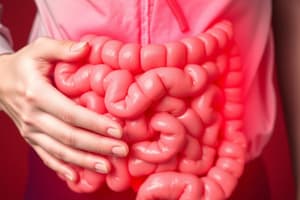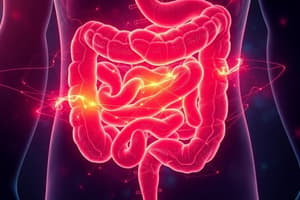Podcast
Questions and Answers
Which of the following is NOT a recommended strategy for managing Irritable Bowel Syndrome (IBS)?
Which of the following is NOT a recommended strategy for managing Irritable Bowel Syndrome (IBS)?
- Keeping a detailed diary of symptoms, diet, and stress episodes.
- Following a high-FODMAP diet to intentionally trigger symptoms for better tracking. (correct)
- Exploring cognitive behavior therapy and stress management techniques.
- Engaging in regular physical exercise.
For patients experiencing Irritable Bowel Syndrome with constipation (IBS-C), which dietary approach would be most appropriate?
For patients experiencing Irritable Bowel Syndrome with constipation (IBS-C), which dietary approach would be most appropriate?
- A low-fiber diet to reduce bowel stimulation.
- A diet rich in fiber to facilitate softer, more comfortable bowel movements. (correct)
- Eliminating dairy products, including yogurt, from the diet.
- A diet high in processed foods to bind bowel movements.
What is the primary function of antispasmodic medications in the treatment of Irritable Bowel Syndrome (IBS)?
What is the primary function of antispasmodic medications in the treatment of Irritable Bowel Syndrome (IBS)?
- To decrease gastrointestinal motility and reduce smooth muscle spasms. (correct)
- To induce inflammation to desensitize nerves in the gut.
- To increase gastrointestinal motility.
- To promote the absorption of fluids in the colon.
Which medication for Irritable Bowel Syndrome with diarrhea (IBS-D) is available only through a restricted access program due to serious side effects?
Which medication for Irritable Bowel Syndrome with diarrhea (IBS-D) is available only through a restricted access program due to serious side effects?
Linaclotide (Linzess) is used in the treatment of IBS-C but is contraindicated in which patient population?
Linaclotide (Linzess) is used in the treatment of IBS-C but is contraindicated in which patient population?
Which of the following is a diagnostic criterion for Irritable Bowel Syndrome (IBS)?
Which of the following is a diagnostic criterion for Irritable Bowel Syndrome (IBS)?
Which non-gastrointestinal (non-GI) symptom is commonly associated with irritable bowel syndrome?
Which non-gastrointestinal (non-GI) symptom is commonly associated with irritable bowel syndrome?
Which factor is NOT typically associated with the exacerbation of Irritable Bowel Syndrome(IBS)?
Which factor is NOT typically associated with the exacerbation of Irritable Bowel Syndrome(IBS)?
Which category of dietary compounds includes lactose, found in milk?
Which category of dietary compounds includes lactose, found in milk?
Which of the following is NOT considered an example of a food high in FODMAPs, which may exacerbate IBS symptoms?
Which of the following is NOT considered an example of a food high in FODMAPs, which may exacerbate IBS symptoms?
To rule out other disorders, a patient being evaluated for IBS may undergo tests for conditions such as:
To rule out other disorders, a patient being evaluated for IBS may undergo tests for conditions such as:
Which of the following is a common symptom associated with IBS in addition to abdominal pain?
Which of the following is a common symptom associated with IBS in addition to abdominal pain?
Besides medication and diet, what additional support is recommended as treatment for IBS?
Besides medication and diet, what additional support is recommended as treatment for IBS?
Flashcards
What is Irritable Bowel Syndrome (IBS)?
What is Irritable Bowel Syndrome (IBS)?
A common gastrointestinal disorder characterized by chronic abdominal pain and abnormal bowel patterns.
Who is more likely to have IBS: men or women?
Who is more likely to have IBS: men or women?
IBS affects women more often than men, with a ratio of 2:2.5.
What are the known causes of IBS?
What are the known causes of IBS?
The exact cause of IBS is unknown, but factors like stress, family history, food intolerances, and past GI infections may play a role.
How can diet impact IBS symptoms?
How can diet impact IBS symptoms?
Signup and view all the flashcards
Why is medical evaluation important for IBS?
Why is medical evaluation important for IBS?
Signup and view all the flashcards
Can mental health have an impact on IBS?
Can mental health have an impact on IBS?
Signup and view all the flashcards
How is IBS categorized based on bowel patterns?
How is IBS categorized based on bowel patterns?
Signup and view all the flashcards
What is the treatment approach for IBS?
What is the treatment approach for IBS?
Signup and view all the flashcards
Low-FODMAP Diet
Low-FODMAP Diet
Signup and view all the flashcards
Cognitive Behavior Therapy (CBT)
Cognitive Behavior Therapy (CBT)
Signup and view all the flashcards
Antispasmodics in IBS treatment
Antispasmodics in IBS treatment
Signup and view all the flashcards
Linaclotide for IBS-C
Linaclotide for IBS-C
Signup and view all the flashcards
Exercise and IBS
Exercise and IBS
Signup and view all the flashcards
Study Notes
Irritable Bowel Syndrome (IBS)
- IBS is a chronic disorder marked by abdominal pain and altered bowel habits.
- Women are affected 2 to 2.5 times more than men.
- No known cause, but psychological stressors (depression, anxiety) and a family history of IBS are associated.
- GI infections and adverse food reactions might contribute.
- Some food intolerances include FODMAPs (fermentable oligo-, di-, and monosaccharides and polyols).
- Examples include wheat, rye, certain fruits, vegetables, onions, garlic, legumes, nuts, lactose (milk/dairy), fructose (honey, apples, pears), and polyols (apples, pears, stone fruits).
- IBS is categorized by stool patterns:
- IBS-C (constipation),
- IBS-D (diarrhea),
- IBS mixed,
- IBS unsubtyped.
- Other symptoms include abdominal bloating, nausea, flatulence, urgency, mucus in stool, sensation of incomplete evacuation, fatigue, headache, and sleep problems.
- Diagnosis depends on detailed history taking, physical exam, and ruling out other conditions (e.g., CRC, IBD).
- Assessing symptoms, health history (stress, anxiety), family history, diet, and how symptoms interfere with daily life.
- Treatment is individualized.
- Psychological support, diet changes (low FODMAP), lifestyle adjustments (exercise)
- Medications (antispasmodics, antidepressants) to control symptoms.
- Examples of medications include Eluxadoline, rifaximin, and alosetron.
- Probiotics may help, especially if there is an issue with dairy.
- Avoiding gas-producing foods (e.g., broccoli, cabbage) might help those with flatulence.
- High-fiber diets helpful with reducing pain from bowel movements.
- Using therapies like cognitive behavioral therapy, helping manage stress.
- If dairy is a problem, yogurt may be a more tolerable option due to lactobacillus bacteria.
- Probiotics may help improve symptoms.
Studying That Suits You
Use AI to generate personalized quizzes and flashcards to suit your learning preferences.




